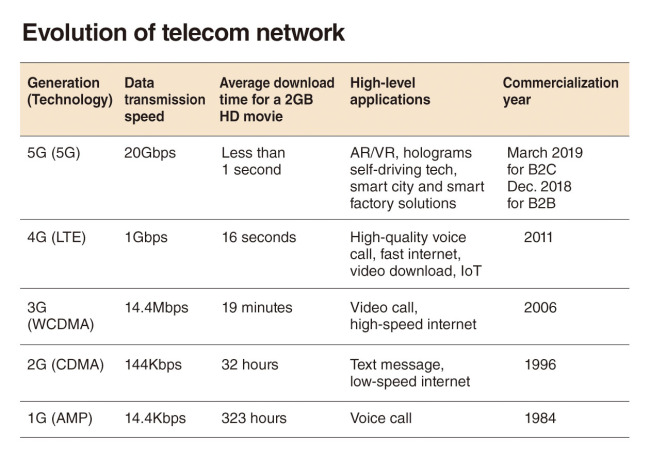5G to change Korea’s telecom industry landscape in 2019
Telcos to seek marriage with media industry to provide high-quality 5G content
By Song Su-hyunPublished : Jan. 1, 2019 - 14:33
The Year 2019 will be a cutthroat yet exciting year for South Korea’s telecommunications businesses as the introduction of faster fifth-generation telecom networks in March augurs upheavals in their own and other industries.
The Korean mobile operators at the forefront of the 5G commercialization are widely expected to escape their traditional areas of business, mainly centering on providing high-speed internet and high-quality calls, stretching out to the media industry by providing new services enabled by the 5G network.
Compared to the current 4G Long Term Evolution mobile network, the 5G network provides 20 times faster speed for data transmission, allowing users to download a 2-gigabyte high-definition movie in less than a second.
The Korean mobile operators at the forefront of the 5G commercialization are widely expected to escape their traditional areas of business, mainly centering on providing high-speed internet and high-quality calls, stretching out to the media industry by providing new services enabled by the 5G network.
Compared to the current 4G Long Term Evolution mobile network, the 5G network provides 20 times faster speed for data transmission, allowing users to download a 2-gigabyte high-definition movie in less than a second.

Because it is crucial for the mobile operators to provide ideal content for the 5G network infrastructure in order to preoccupy the new network market with new subscribers, the country’s three mobile carriers -- SK Telecom, KT and LG Uplus in order of sales -- are preparing to acquire or seek partnerships with small and mid-size broadcasters or media content startups.
No.1 player SKT is forging ties with over-the-top mobile video content provider Pooq, run by the country’s three terrestrial broadcasters, in order to strengthen its own platform Oksusu that aims to rival Netflix.
SKT’s bigger plan is to spin off the Oksusu platform as one of four major subsidiaries along with the mobile network operator, and security and commerce arms.
This is also part of SKT CEO Park Jung-ho’s plan to establish an intermediary financial holding company – dubbed “ICT holding company of SK Group -- that take control of the current four business areas of SKT.
KT is closely monitoring archrival SKT’s moves to start the new OTT business in a bid to lose out in the 5G content market.
KT’s New Media Business Group will be led by Kim Hoon-bae, former CEO of Genie Music -- the mobile carrier’s music streaming platform -- this year, which will focus on developing creative 5G content for its customers.
“KT is making efforts internally to develop content for 5G, for example the GiGA Live VR service on its IPTV platform,” said a KT official.

The company is also expanding Olleh TV subscribers’ access to TV content further to their mobile devices by launching Olleh TV Mobile application.
LG Uplus is gearing up for acquisition of CJ HelloVision, a cable TV channel provider under CJ Group, in order to enhance its cable TV business.
If LG acquires the CJ channel, it would become the second-largest cable TV service provider, beating out SKT’s Broadband with a total of 24.43 percent market share. KT is currently the market leader with a 30.86 percent share.
Taking a larger share of the pay TV market is becoming more important for the mobile carriers, because their internet protocol TV service subscribers are key customers for the home media business that would further develop into the future content business.
“Securing ideal content for the 5G network is the key to success in the new network market,” said an LG Uplus official. “We are seeking to enlarge the size of the home media business by securing more content provided by competitive third-party content providers with an ultimate goal of offering video content for 5G mobile customers, because the home media and mobile users prefer combined service plans.”
In an effort to attract around 300,000 Netflix users in Korea, LG Uplus has partnered with the US OTT business to offer access to Netflix content via its IPTV platform.
According to a report by KT Economics and Management Research Institute, the media industry is predicted to gain 3.6 trillion won in socioeconomic value by 2030 with the commercial use of 5G technology.
The report also mentioned the 5G technology will bring augmented reality and virtual reality content to end users, creating a new category in the media market.
By Song Su-hyun (song@heraldcorp.com)








![[Graphic News] More Koreans say they plan long-distance trips this year](http://res.heraldm.com/phpwas/restmb_idxmake.php?idx=644&simg=/content/image/2024/04/17/20240417050828_0.gif&u=)
![[KH Explains] Hyundai's full hybrid edge to pay off amid slow transition to pure EVs](http://res.heraldm.com/phpwas/restmb_idxmake.php?idx=644&simg=/content/image/2024/04/18/20240418050645_0.jpg&u=20240419100350)





![[From the Scene] Monks, Buddhists hail return of remains of Buddhas](http://res.heraldm.com/phpwas/restmb_idxmake.php?idx=652&simg=/content/image/2024/04/19/20240419050617_0.jpg&u=20240419175937)

![[KH Explains] Hyundai's full hybrid edge to pay off amid slow transition to pure EVs](http://res.heraldm.com/phpwas/restmb_idxmake.php?idx=652&simg=/content/image/2024/04/18/20240418050645_0.jpg&u=20240419100350)

![[Today’s K-pop] Illit drops debut single remix](http://res.heraldm.com/phpwas/restmb_idxmake.php?idx=642&simg=/content/image/2024/04/19/20240419050612_0.jpg&u=)